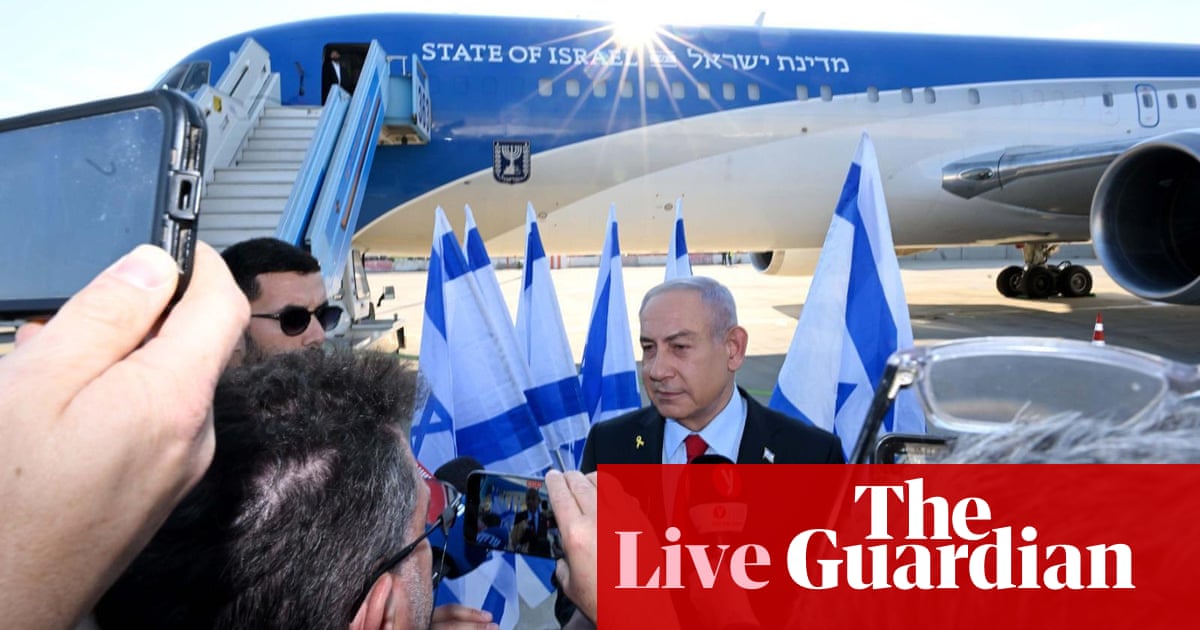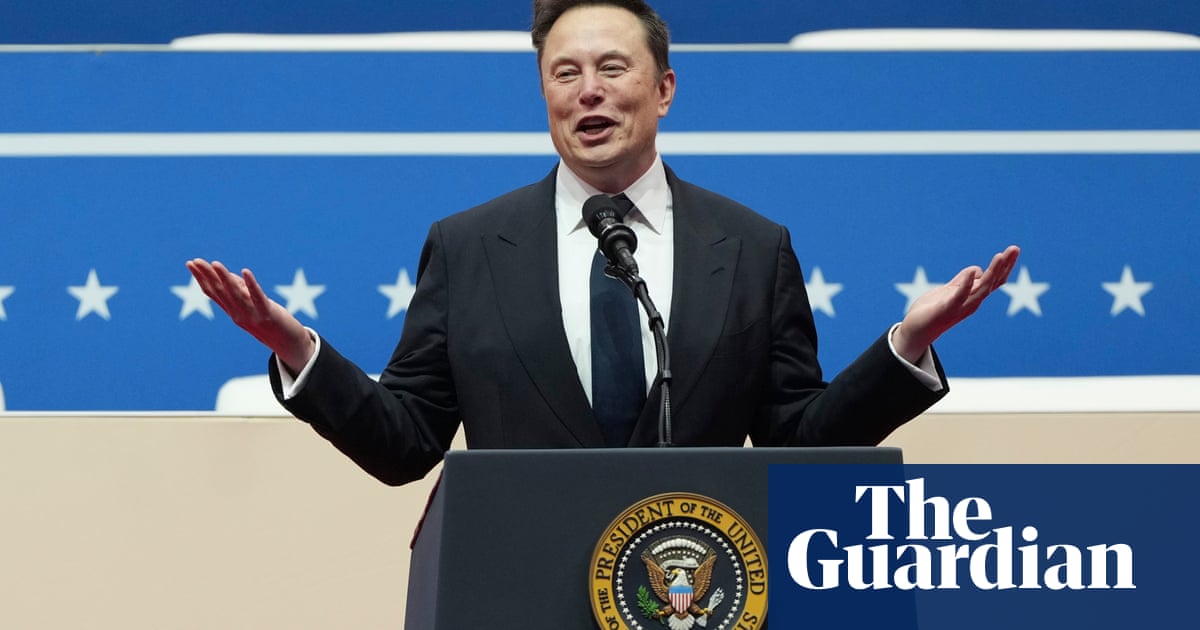Benjamin Netanyahu in Washington for Gaza ceasefire talks
Hello and welcome to our live coverage of the Middle East.
Israeli prime minister Benjamin Netanyahu is expected to begin talks today on brokering a second phase of the ceasefire with Hamas, his office said, as he visits the new Trump administration in Washington.
Ahead of his departure, Netanyahu told reporters he would discuss “victory over Hamas”, without defining what this would mean in practical terms, contending with Iran and freeing all hostages when he meets with the US President on Tuesday.
It will be Trump’s first meeting with a foreign leader since returning to the White House in January, a prioritisation Netanyahu called “telling”.
“I think it’s a testimony to the strength of the Israeli-American alliance,” he said before boarding his flight.

He was welcomed to the US capital on Sunday night by Israel’s ambassador to the UN Danny Danon, who stressed the coming Trump-Netanyahu meeting would strengthen “the deep alliance between Israel and the United States and will enhance our cooperation”.
Netanyahu’s office said he would begin discussions with Trump’s Middle East envoy Steve Witkoff on Monday over terms for the second phase of the truce.
The initial, 42-day phase of the deal is due to end next month. The next stage is expected to cover the release of the remaining captives and to include discussions on a more permanent end to Israel’s war on Gaza.
Key events
Talks between Turkey’s president, Recep Tayyip Erdoğan, and Syria’s interim president, Ahmed al-Sharaa, at the presidential palace in the Turkish capital of Ankara will focus on “joint steps to be taken for economic recovery, sustainable stability and security” in Syria, Fahrettin Altun, head of communications at the presidency, said.
“We believe that the Turkey-Syria relations, which were re-established after Syria regained its freedom, will be strengthened and gain dimension,” he added.
Ahmed al-Sharaa, the former leader of Hayat Tahrir al-Sham (HTS), the Islamist rebel group which led the military operation to topple the former president of Syria, Bashar al-Assad, will visit Turkey on Tuesday on his second international visit since the rebel offensive.
Sharaa “will pay a visit to Ankara on Tuesday at the invitation of our President Recep Tayyip Erdogan,” Fahrettin Altun, head of communications at the presidency, wrote in a post on X.
Sharaa, who last week was appointed president of Syria for a “transitional period”, has been trying to gain support from Arab and western leaders since Assad was toppled in December.
Since the fall of Assad, al-Sharaa, who was officially designated a terrorist by the US in 2013 because of his former leadership of al-Nusra Front, a splinter group of al-Qaida, has struck a conciliatory tone, calling for Syrian unity, the protection of minorities and the disbanding of rebel factions. But some officials believe it is too early to assess his sincerity.
Since Syrian rebels launched an offensive to take the country in November, Turkish-backed fighters have targeted Kurdish forces, taking a number of towns. Meanwhile, the Turkish military has maintained pressure on Kurdish fighters in both Syria and northern Iraq.
Iran warns against ‘ethnic cleansing’ of Palestinians after Trump’s Gaza proposal
Iran has condemned Donald Trump’s widely criticised proposal to relocate Palestinian people from the Gaza Strip to neighbouring countries, warning it would amount to “ethnic cleansing”.
Foreign ministry spokesperson Esmaeil Baqaei has been quoted by the Agence France-Presse (AFP) news agency saying that the international community should help Palestinians “secure their right to self-determination… rather than pushing for other ideas that would be tantamount to ethnic cleansing”.
As a reminder, Trump caused outrage last weekend when he proposed that large numbers of Palestinian people should leave Gaza in order to “just clean out” the whole strip, saying neighbouring countries such as Jordan and Egypt should take in more Palestinians, either temporarily or for the long term. The Palestinian Authority, Hamas and the US’s regional allies were among those who condemned Trump’s proposal.
Jordan is already home to several million Palestinians, while tens of thousands live in Egypt. Both countries and other Arab nations reject the idea of Palestinians in Gaza being moved to their countries.
Israeli forces destroy buildings in Jenin as deadly raid continues
Palestinian news agency Wafa is reporting that the Israeli military is continuing its raid on the West Bank city of Jenin for the 14th consecutive day, which the outlet says has killed at least 25 Palestinian people, injured dozens of others and has involved the demolition of dozens of homes. A spokesperson for the Israeli army said 23 buildings were destroyed on Sunday in Jenin “to prevent terrorist infrastructure from being established there”.
The city’s mayor, Mohammad Jarar, was quoted as saying that about 15,000 people were displaced from the Jenin camp and the al-Hadaf neighbourhood, while Israeli soldiers driving bulldozers are, according to Wafa, “destroying homes” in the al-Damj neighbourhood.
A 73-year-old man was killed by Israeli gunfire in Jenin’s refugee camp, the Palestinian health ministry said yesterday, the latest casualty in Israel’s military operation on the city, which Benjamin Netanyahu says was launched to “eradicate terrorism” in the area.
Jenin’s refugee camp, one of 19 across the West Bank built in the aftermath of Israel’s creation in 1948 to house displaced Palestinians, is a centre of armed Palestinian resistance to the Israeli occupation.
Since the start of the war in October 2023, which has sparked a wave of violence in the West Bank, Israel has raided or carried out airstrikes in Jenin multiple times, killing dozens and leaving a trial of heavy destruction there.
The UN has expressed concern that the ceasefire in Gaza could be endangered by Israel’s military tactics in the West Bank, which have involved what the UN human rights spokesperson labelled “unnecessary or disproportionate use of force”.
Benjamin Netanyahu, who was one of the first to congratulate Donald Trump when he beat Kamala Harris in the November US presidential election, has called the Republican president the “best friend Israel has ever had in the White House”.
During Trump’s first term, he delivered significant diplomatic wins for the Israeli prime minister, including recognising Israeli sovereignty over the Golan Heights in 2019 and supporting the Abraham accords with Gulf states.
Last month, Trump said he had ordered the resumption of shipments of some of the largest bombs to Israel after Joe Biden had paused delivery of them over concerns about their use in densely populated Gaza.
In this story, my colleague Peter Beaumont writes that, while allies, Netanyahu and Trump have competing agendas coming into their meeting tomorrow. Here is an extract from his piece:
On Trump’s side is the apparent desire to have quiet in the Middle East to pursue his policy of widening the 2020 Abraham accords – in which Israel established relations with Bahrain, Morocco and the United Arab Emirates during his first term – to include Saudi Arabia.
Saudi Arabia has made clear that any progress depends on an end to the conflict in Gaza or the establishment of a path towards Palestinian statehood.
On Netanyahu’s side, the objective – according to Israeli officials who briefed the Axios news website – is to understand where Trump stands on the planned start of negotiations for the second phase of a Gaza ceasefire deal, which Netanyahu was reluctantly pushed into by Trump.
Those talks are supposed to begin on Monday, the 16th day of phase one of the ceasefire. But it now looks unlikely they will start until after the Trump-Netanyahu meeting, which has been characterised as an attempt to find a joint US-Israeli position going into the talks.
Other key issues likely to dominate the meeting are a “day after” plan for Gaza, not least how it will be run and by whom, and what position to take on Iran.
Benjamin Netanyahu in Washington for Gaza ceasefire talks
Hello and welcome to our live coverage of the Middle East.
Israeli prime minister Benjamin Netanyahu is expected to begin talks today on brokering a second phase of the ceasefire with Hamas, his office said, as he visits the new Trump administration in Washington.
Ahead of his departure, Netanyahu told reporters he would discuss “victory over Hamas”, without defining what this would mean in practical terms, contending with Iran and freeing all hostages when he meets with the US President on Tuesday.
It will be Trump’s first meeting with a foreign leader since returning to the White House in January, a prioritisation Netanyahu called “telling”.
“I think it’s a testimony to the strength of the Israeli-American alliance,” he said before boarding his flight.
He was welcomed to the US capital on Sunday night by Israel’s ambassador to the UN Danny Danon, who stressed the coming Trump-Netanyahu meeting would strengthen “the deep alliance between Israel and the United States and will enhance our cooperation”.
Netanyahu’s office said he would begin discussions with Trump’s Middle East envoy Steve Witkoff on Monday over terms for the second phase of the truce.
The initial, 42-day phase of the deal is due to end next month. The next stage is expected to cover the release of the remaining captives and to include discussions on a more permanent end to Israel’s war on Gaza.
Article by:Source: Yohannes Lowe














